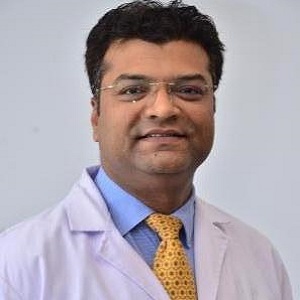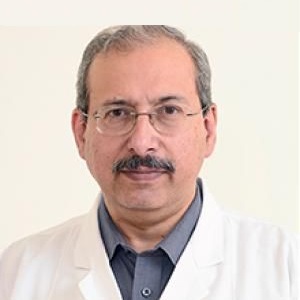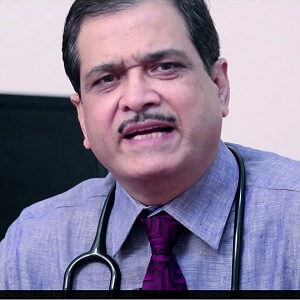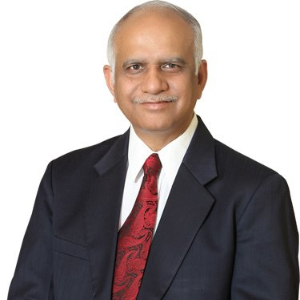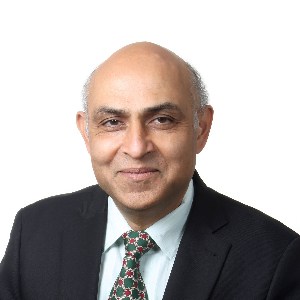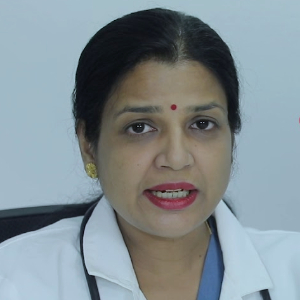Best Doctors in India for Alcoholic Hepatitis Treatment
- Liver Transplant Surgeon & HPB Surgeon, New Delhi, India
- Over 20 years’ experience
- PSRI Hospital
Profile Highlights:
- Dr. Bhushan Bhole is a well-known Liver Transplant Surgeon & HPB Surgeon who has done Advanced Fellowship in Liver Transplantation & Fellowship in Advanced Laparoscopic Surgery, in Birmingham, UK.
- He is an active member of several national surgical associations such as ASI, IASG, IHPBA, ACRSI, MAS, IAGES, IHA & IMA. He has also been awarded many fellowships like FACRSI, IAGES & FMAS.
- Interventional Cardiologist, Chennai, India
- Over 22 years’ experience
- Apollo Hospitals Greams Road
Profile Highlights:
- Dr. Rakesh P Gopal is an Interventional Cardiologist who has done outstanding work in Interventions for Valvular Heart Disease, Mitral, Aortic, Pulmonary Balloon Valvotomy, and Initiation for Trans Aortic Valve replacement.
- He is the editor of the book Cardiovascular Interventional Trials Update, published by Mathew Foundation and Asia Pacific Interventional Cardiology India Educational Trust.
- Dr. Gopal is a firm believer in the No Re-use idea of disposable materials in interventional procedures.
- Top Neurosurgeon | Max Hospital, Saket, New Delhi, India
- 45+ Years Experience
- Max Super Specialty Hospital, Saket, New Delhi
Profile Highlights:
- Dr. V K Jain is a leading neurosurgeon in India with refined medical surgical precision.
- Dr. Jain has worked in a variety of significant positions in hospitals all across the world over the course of his career.
- Dr. Jain has also served as a visiting professor at a number of prestigious hospitals throughout the world.
- He has also attended many conferences, workshops, and seminars and has also been invited as faculty to many conventions both in India and abroad.
- Top Ophthalmologist | Max Hospital, Saket, New Delhi, India
- 29+ Years Experience
- Max Super Specialty Hospital, Saket, New Delhi
Profile Highlights:
- With over 29 years of experience, Dr. Tarun Kapur is one of the most renowned ophthalmologists/eye surgeons based in Delhi.
- Some of the services provided by Dr. Kapur include Avastin Injections, Glaucoma Evaluation / Treatment, Retina Examination, and keratoplasty.
- Dr. Tarun Kapur had also been awarded the National Talent Search Scholarship as well as Junior Science Talent Scholarship.
- Top Interventional Cardiologist | Apollo Hospital, New Delhi, India
- 26+ Years Experience
- Indraprastha Apollo Hospital, New Delhi
Profile Highlights:
- Dr. Rajeev Kumar Rajput is one of the best Cardiologists in India with nearly 23 years of experience. He is a clinical cardiologist engaged in diagnosing and treating cardiovascular diseases.
- Dr. Rajput is currently working as a senior consultant with Indraprastha Apollo Hospitals, New Delhi, and also offers patient care at the Heart & Gynae Clinic.
- Dr. Rajeev Kumar Rajput specializes in Angiography and Interventional Cardiology. The treatments provided involve Neonatal and Infant cardiac surgeries, Device Closure, and Valve replacement. He has expertise in Aortic Aneurysm Surgery, Vascular Surgery, Percutaneous Coronary Interventions, Endovascular Repair, Cardiac Catheterisation, Open Heart Surgery, and MV replacement.
- Dr. Rajput is credited with publishing several papers in noted medical journals.
- Gastroenterologist, Chennai, India
- Over 13 years’ experience
- Apollo Clinic Valasaravakkam; Chennai
Profile Highlights:
- Dr. M Tarakeshwari is a well-known gastroenterologist who provides various services to her patients and is an expert in cytokines in IBS, treating Hepatitis B in pregnancy as well as renal failure in Cirrhosis.
- Some of the services provided by the Dr. M Tarakeshwari are: Acidity Treatment, Gallbladder (Biliary) Stone Treatment, Bladder Cancer Surgery, Inflammatory Bowel Disease (IBD) Treatment Ulcerative Colitis Treatment, etc
- Top Pediatric Cardiologist | Kokilaben Hospital, Mumbai, India
- 20+ Years Experience
- Kokilaben Dhirubhai Ambani Hospital
Profile Highlights:
- Dr. Snehal Kulkarni is a renowned pediatric cardiologist who specializes in the management and treatment of fetal cardiac diseases, non-invasive pediatric cardiology, and Adult Congenital heart diseases.
- She is an expert in Diagnostic and Interventional Cardiac Catheterization, Stent implantation, Cardiac Pathology, and Balloon dilatation.
- She has more than 2 decades of experience in pediatric cardiology and has acquired her training from prestigious institutions in USA.
- Top Cardiac Surgeon | Max Hospital, Saket, New Delhi, India
- 37+ Years Experience
- Max Super Specialty Hospital, Saket, New Delhi
Profile Highlights:
- Dr. S K Sinha currently serves as the Senior Director of CTVS at Max Super Speciality Hospital, Saket, a role he has held since April 2018.
- With over 37 years of dedicated experience in cardiac surgery, Dr. Subhash Kumar Sinha is a distinguished leader in the field of Cardiac Sciences.
- ducationally, Dr. Sinha’s credentials are impressive. He earned his MBBS from Armed Forces Medical College, Pune, followed by a Masters of Surgery from Patna Medical College and an M.Ch. in CTVS from the Post Graduate Institute of Medical Education and Research, Chandigarh.
- Senior Consultant - Cardiology, Dwarka, New Delhi, India
- Over 35 years’ experience
- Manipal Hospitals, New Delhi
Profile Highlights:
- Dr. Monik Mehta is one of the best interventional cardiologists in India for the implantation of heart failure devices.
- His specialization also lies in performing complex Angioplasties and complex coronary interventions.
- Having received his training from Mahidol University, Bangkok, Dr. Monik Mehta has also worked with the United Nations as a cardiologist in Cambodia.
- Currently, he works as a Senior Consultant – Cardiology, in Manipal Hospitals, Dwarka, New Delhi.
- IVF Specialist & Gynaecologist, Bengaluru, India
- Over 15 years’ experience
- Nova IVI Fertility Bengaluru
Profile Highlights:
- Dr. Pallavi Prasad is a well-known Gynecologist in Bengaluru specializing in infertility and IVF.
- Dr. Prasad is a specialist in all kinds of Artificial Reproductive Techniques (ART) including IVF, ICSI, IUI, and IMSI. She also provides services for vitrification and cryopreservation.
- Dr. Pallavi Prasad has also written articles and papers on her field of expertise and has published several columns on infertility and ART in renowned journals and newspapers.
Best Hospitals in India for Alcoholic Hepatitis Treatment
ALCOHOLIC HEPATITIS
Alcoholic hepatitis is a liver infection, which is mainly caused by frequent, heavy use of alcohol. Fat can build up in the liver cells, which might lead to inflammation as well as scarring of the liver.
Alcoholic hepatitis might be mild or severe. A patient might even need a liver transplant if proper treatment is not provided, or if they don’t stop consumption of alcohol.
It is also notable that all heavy drinkers don’t develop this condition, and sometimes this condition even develops in people who drink moderately. However, if you are diagnosed with this condition, it is important for you to quit drinking alcohol. People who continue drinking alcohol might face a huge risk of serious liver damage as well as death.
Symptoms
Depending on the amount of damage to the liver, the symptoms can vary. If you are having a mild form of the disease, you might not even experience any symptoms at all. However, as the damage continues to grow, you might experience the following:
- Changes in appetite
- Dry mouth
- Weight loss
- Pain or swelling in the abdomen
- Jaundice, or yellowing of the skin or eyes
- Fever
- Nausea and vomiting
- Easy bleeding or bruising
- Changes in your mental state, including confusion
- Fatigue
The symptoms of this condition are similar to those caused by a few other health conditions. Therefore, if you develop any of these symptoms, it is best to get a proper diagnosis as well as begin treatment.
Causes & risk factors
Alcoholic hepatitis generally develops when the alcohol you drink causes damage to your liver. However, it is not clear why alcohol does this damages only to some heavy drinkers.
Few factors that are known to play a role in this condition include:
- The body’s process that breaks down alcohol produces some toxic chemicals
- These chemicals can trigger inflammation that can destroy the liver cells
- Thus, over time, scars replace healthy liver tissue, thus interfering with the function of the liver
- This irreversible scarring, which is also termed cirrhosis, is the final stage of alcoholic liver disease
If you have hepatitis C and continue to drink, even moderately, you are more likely to develop cirrhosis.
Some heavy drinkers are also malnourished because they don’t eat a proper balanced diet. Alcohol and its byproducts also prevent the body from absorbing nutrition properly. Lack of nutrition can contribute to liver cell damage.
Some other risk factors that can lead to this condition include:
- Your sex- Women are usually at a higher risk of developing alcoholic hepatitis since the way alcohol is processed in women is different.
- Binge drinking- Having over five drinks within two hours for men and four or more for women can increase the risk of alcoholic hepatitis.
- Obesity- Heavy drinkers who are overweight are also more likely to develop alcoholic hepatitis and to progress from that condition to cirrhosis.
- Race and ethnicity- Hispanic and Negroid people might be at higher risk of alcoholic hepatitis.
- Genetic factors- According to studies, there may be a genetic component in alcohol-induced liver disease. However, it is difficult to separate genetic and environmental factors.
Diagnosis
If you are showing symptoms of alcoholic hepatitis, your doctor will first inquire about your medical history and alcohol consumption. Next, he/she will perform a physical exam to see if you have an enlarged liver or spleen. They might also need a few more tests to confirm your diagnosis, such as:
- Complete blood count (CBC)
- Liver function test
- Ultrasound of the liver
- Abdominal CT scan
- Blood clotting tests
In some cases, a liver biopsy might also be needed to confirm the diagnosis of alcoholic hepatitis. A liver biopsy requires your doctor to remove a tissue sample from your liver, which is then tested in the lab. This method helps to show the severity and type of liver disease.
Treatment
Stopping alcohol consumption is the most important treatment for alcoholic hepatitis. There is no cure for this condition, but treatment can help in reducing or eliminating symptoms, or stopping its progression.
It is also important to note that scarring of the liver is permanent, but treatment can aim to restore as much function as possible.
Dietary changes
Medication
Liver transplant
The best hope of recovery is to be aware of the signs and symptoms as well as to reduce, manage, or if possible, completely stop consumption of alcohol.
Complications
Alcoholic hepatitis might lead to severe other complications such as:
- Enlarged veins (varices)- In this condition, blood that is unable to flow freely through the portal vein, can back up into other blood vessels in your esophagus or stomach.
- Hepatic encephalopathy- This condition can be caused by the buildup of toxins if your damaged liver is unable to remove all the toxins from your body. It involves confusion, drowsiness, and slurred speech.
- Ascites- Ascites is a condition in which the fluid that accumulates in the abdomen may get infected and thus, require treatment with antibiotics. Although this condition is not life-threatening, it can be a sign of advanced alcoholic hepatitis, or cirrhosis.
- Kidney failure- A damaged liver affects blood flow to the kidneys, thus resulting in kidney failure.
- Cirrhosis- The scarring of the liver might lead to liver failure.
Prevention
Alcoholic hepatitis might be prevented if you take the following steps:
- Drink alcohol in moderation, if at all- For healthy adults, moderate drinking means no more than one drink a day for women of all ages and men older than 65, and not over two drinks a day for men aged 65 and younger. However, if you prevent all alcohol, it is a certain way to prevent this condition.
- Check before mixing medications and alcohol- Ask your doctor if it’s safe to drink alcohol while you are taking medications. Consider reading the warning labels on over-the-counter medications as well. Don’t drink alcohol when you are taking medications that warn of complications when combined with alcohol.
- Protect yourself from hepatitis C- Hepatitis C is an infectious liver disease that is caused by a virus. If it is left untreated, it may lead to cirrhosis. If you are having hepatitis C and you consume alcohol, you’re generally more likely to develop cirrhosis than if you don’t drink.

